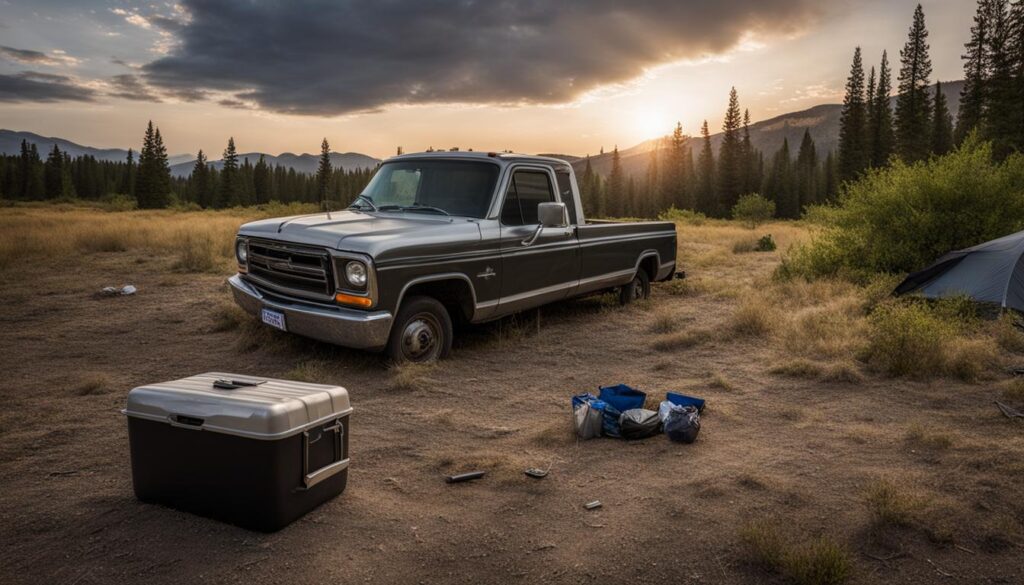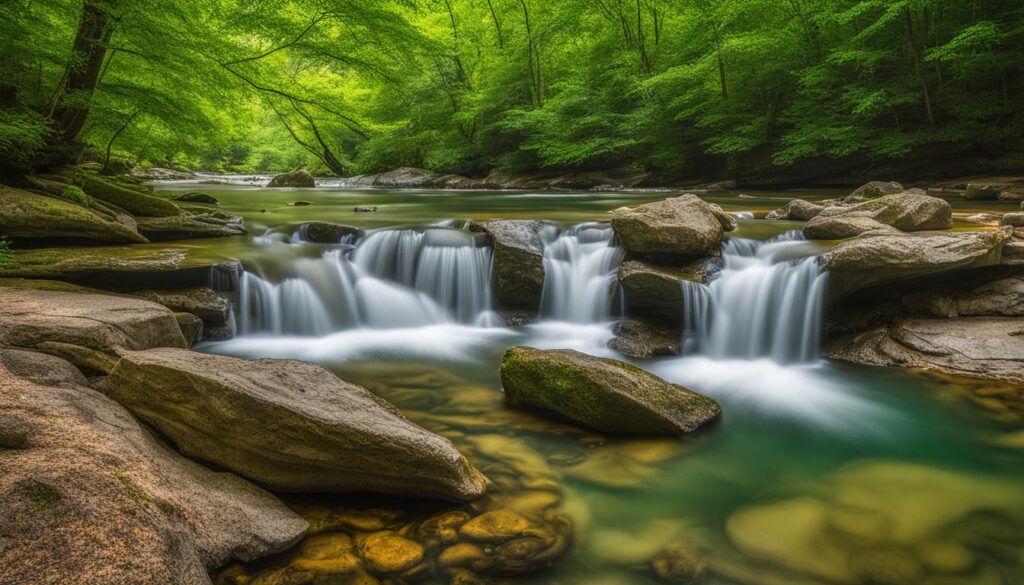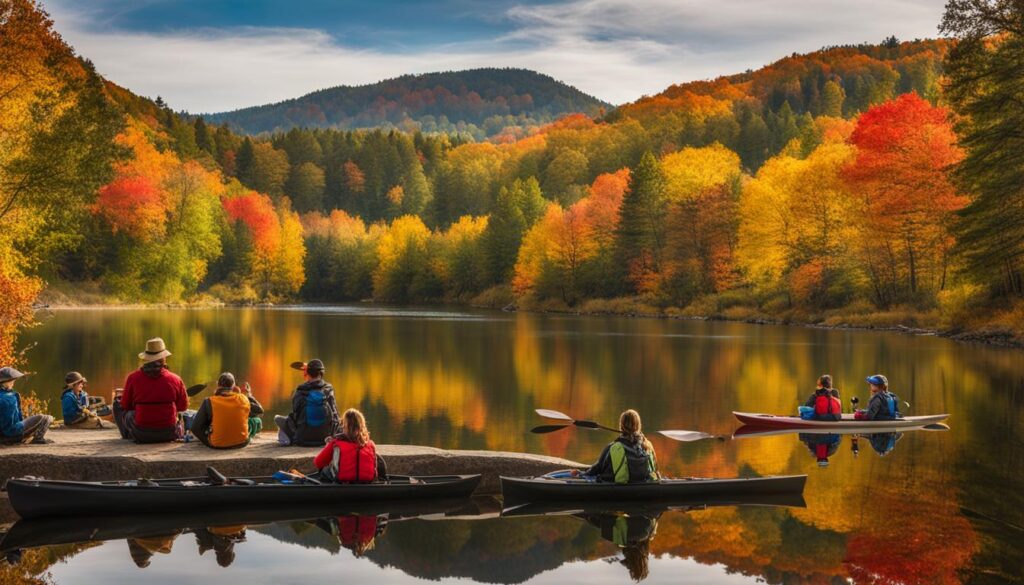When I think of camping, I imagine serene natural landscapes, starlit nights, and unforgettable experiences with friends and family. However, there are instances when camping can turn into a nightmare filled with unpleasant surprises and unexpected hazards. In this article, I will explore some of the camping horror stories, disasters, accidents, and mishaps that campers have encountered, along with essential tips to help you avoid these unfortunate experiences.
Key Takeaways:
- Campsite fee increases can lead to discontent among campers and should be communicated transparently.
- Wildlife encounters, like those with bears, can become dangerous if proper safety precautions aren’t taken.
- Avoid common camping mistakes, such as not researching the campsite and neglecting to test camping equipment.
- Arriving at the campsite in daylight is crucial for safe and efficient setup.
- Proper food storage and waste disposal practices can prevent insect infestations.
Contents
- 1 Beware of Bears: Campsite Safety Tips
- 2 Essential Camping Mistakes to Avoid
- 3 Setting Up Camp: The Importance of Daylight
- 4 Food Safety: Protecting Against Creepy Crawlies
- 5 Camping Etiquette: Being Considerate Neighbors
- 6 Camping Safety: First Aid Kits and Preparedness
- 7 The Value of Campsite Research and Choosing the Right Gear
- 8 FAQ
- 9 Source Links
Beware of Bears: Campsite Safety Tips
When it comes to camping, encounters with wildlife can be thrilling but also potentially dangerous. One creature that campers definitely don’t want to come face-to-face with is the black bear. These majestic creatures are attracted to campsites primarily due to the presence of food sources. With their extraordinary sense of smell, even well-fed bears can’t resist the temptation of an easy meal. Therefore, it’s crucial for campers to take necessary precautions to avoid dangerous encounters and ensure a safe camping experience.
Storing Food Properly:
Campers should store their food in bear-resistant containers, which are specifically designed to keep bears out. These containers are made of sturdy materials that bears are unable to break into, keeping your food and other scented items secure. It’s important to store food away from sleeping areas, as bears can be attracted to the scent and may approach the tents in search of an easy snack. By properly storing food, campers can significantly reduce the risk of bear encounters and potential mishaps.
Avoiding Strong Odors:
Bears have an incredibly strong sense of smell, so it’s important to avoid bringing any items with strong odors that can attract them. This includes items such as scented toiletries, perfumes, and even heavily fragranced food. Campers should be mindful of the products they bring along and opt for unscented alternatives whenever possible. By minimizing strong odors, campers can reduce the likelihood of attracting bears to their campsites.
Keeping Food Separate:
During meal times, it’s crucial to keep food separate from sleeping areas. Campers should set up a designated area for cooking and eating, ensuring that food is not consumed inside tents. This practice helps eliminate any scent of food that may linger inside sleeping quarters and helps discourage bears from venturing closer to the campsite in search of food.
Being Prepared:
While taking precautions can significantly reduce the chances of encountering bears, it’s important to be prepared for unexpected events. Campers should carry bear spray, a form of pepper spray specifically designed to deter bears, as part of their camping gear. Additionally, familiarize yourself with bear safety procedures and strategies for deterring bears, such as making loud noises or using air horns to scare them away.
To further illustrate the importance of bear safety, here’s a table comparing camping mishaps that occur with and without proper bear safety precautions:
| Without Bear Safety Precautions | With Bear Safety Precautions |
|---|---|
| Dangerous encounters with bears | Reduced risk of bear encounters |
| Damage to property caused by bears searching for food | Minimized risk of property damage |
| Potential injuries from bear attacks | Increased safety and decreased risk of bear attacks |
| Disturbance of sleep due to bear activity | Enhanced sleep quality with fewer bear-related disturbances |
| Unpleasant camping experience | Increased likelihood of a safe and enjoyable camping trip |
By following these bear safety tips and being well-prepared, campers can minimize the risk of dangerous encounters and ensure a safe and pleasant camping experience. It’s always better to be proactive and take the necessary precautions to protect oneself and the wildlife.
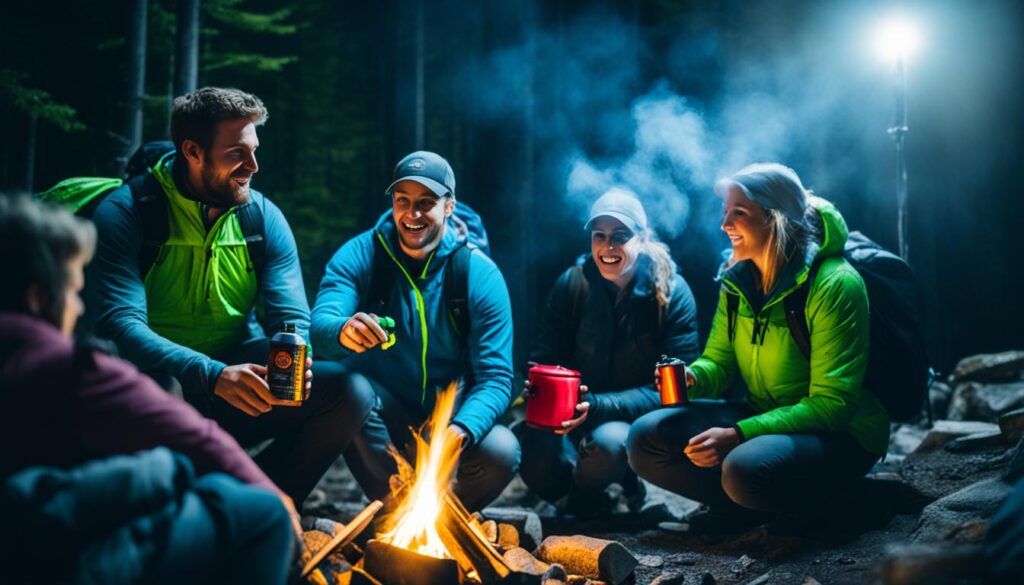
Essential Camping Mistakes to Avoid
To ensure a successful camping trip, it’s important to avoid common mistakes. Let’s take a closer look at some essential camping mistakes that can turn your outdoor adventure into a nightmare.
Neglecting Campsite Research
One major mistake campers often make is forgetting to thoroughly research the campsite before arrival. This can lead to unpleasant surprises, such as limited amenities, overcrowded sites, or facilities that don’t meet your expectations. Avoid camping horror stories by spending some time researching the campsite’s reviews, available facilities, and overall reputation. It will help you choose the perfect spot for your camping getaway and ensure a more enjoyable experience.
Skipping Equipment Testing
Before heading out into the wilderness, it’s crucial to test your camping equipment. Neglecting this step can result in non-functional or inefficient gear. Imagine being in the middle of nowhere with a broken tent or faulty stove. To avoid camping disasters, set up your tent, test your camping stove, and check any other equipment you plan to bring. This way, you’ll be well-prepared and won’t face any unpleasant surprises when you arrive at your campsite.
Ignoring Camping Etiquette
Camping is not just about enjoying nature but also about respecting other campers and the environment. Ignoring camping etiquette can lead to unpleasant experiences and conflicts with other campers. Remember to be considerate of noise levels, follow campground rules, and respect quiet hours. By doing so, you’ll contribute to a harmonious camping atmosphere and avoid any unnecessary confrontations.
Experimenting with New Diets
Camping is not the best time to try out new diets or experiment with unfamiliar foods. Introducing new foods into your system while away from the comforts of home can lead to digestive issues and discomfort. Stick to familiar and easy-to-digest meals to prevent any unpleasant mishaps that can spoil your camping experience.
Bringing Perishable Food and Fragile Beverages
Avoid bringing perishable food items that may spoil quickly, especially if you don’t have proper refrigeration. Spoiled food can not only ruin meals but also attract unwanted pests to your campsite. Additionally, packing heavy bottled beverages that can break easily can become a messy disaster. Opt for lightweight and durable alternatives to avoid dealing with broken glass and spills during your trip.
Forget About the Weather and Leave Out Essentials
Checking the weather forecast before your camping trip is crucial. Failing to do so can result in being unprepared for unexpected weather changes. Always pack appropriate clothing for both hot and cold temperatures, and remember to bring a first aid kit in case of emergencies. Don’t forget to confirm whether pets are allowed at the campsite and make necessary arrangements to keep your furry friends safe.
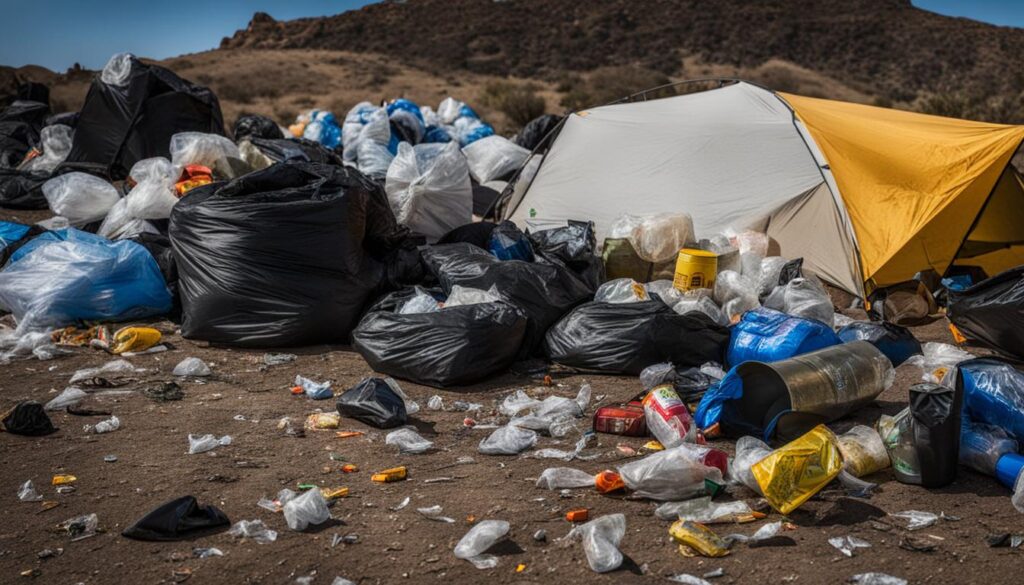
Setting Up Camp: The Importance of Daylight
Arriving at the campsite in daylight is essential for a smooth and safe camping experience. Setting up tents and other camping equipment becomes more challenging and potentially hazardous in the dark. Lack of visibility increases the risk of accidents, tripping hazards, and delays in the set-up process. To avoid camping mishaps and unpleasant experiences while camping, it is strongly recommended to arrive early at the campsite, allowing ample daylight for setting up.
Setting up camp during daylight hours offers several advantages:
- Improved Safety: With good lighting, campers can easily identify potential hazards such as uneven terrain, low branches, or nearby bodies of water. This allows for better navigation around the campsite and reduces the likelihood of accidents and injuries.
- Efficient Equipment Assembly: Properly pitching a tent, arranging camping furniture, and setting up cooking equipment are all tasks that require attention to detail. Having sufficient daylight streamlining the process, ensuring that everything is properly organized and functioning as intended, helping to avoid camping disasters.
- Smoother Navigation: Arriving early enables campers to explore the campsite and familiarize themselves with its layout. They can easily locate amenities such as bathrooms, water sources, and fire pits, ensuring convenience throughout their camping trip.
So remember, when planning your next camping adventure, factor in the time needed to reach your chosen campsite before sunset. By arriving at the campsite with daylight to spare, you’ll be able to set up your camp safely, efficiently, and with minimal stress.
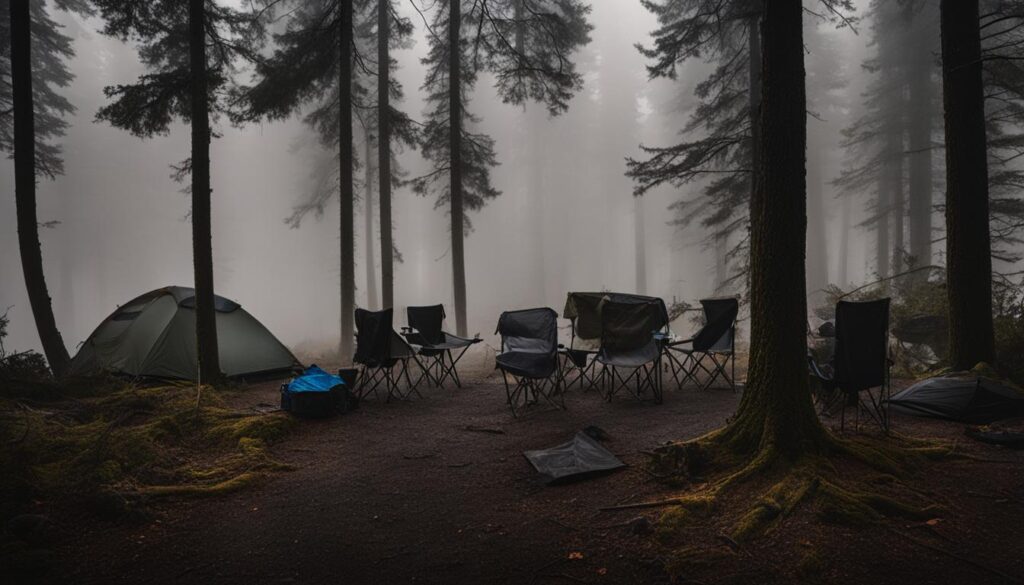
Food Safety: Protecting Against Creepy Crawlies
When camping, proper food storage and handling are crucial to avoid attracting ants, flies, and other insects to your campsite. Not only can these creepy crawlies be a nuisance, but they can also pose unexpected hazards and lead to camping mishaps. To ensure a bug-free camping experience, follow these food safety tips:
Store Food in Airtight Containers
One of the best ways to prevent insect infestations is to store your food in airtight containers. This helps to keep the smell of food from wafting through the air and attracting unwanted visitors to your campsite. Opt for containers with secure lids that are specifically designed to keep insects out.
Minimize Food Particles
It’s important to minimize food particles while eating at the campsite. Spread a tarp or picnic blanket on the ground to catch any food crumbs or spills. This simple step reduces the chances of attracting ants, flies, and other insects that are drawn to food debris. Aside from keeping your campsite clean and bug-free, it also promotes responsible camping.
Properly Dispose of Waste
When it comes to food safety while camping, proper waste disposal is vital. Leaving food scraps or packaging lying around can not only invite insects but also attract small animals. Make sure to dispose of your waste in designated trash containers or bear-proof bins. Keep your campsite clean and free from any potential attractions for unwanted visitors.
Remember, by taking precautions and following proper food safety practices, you can protect yourself and your campsite from unexpected hazards related to creepy crawlies.
Camping Etiquette: Being Considerate Neighbors
When embarking on a camping adventure, being a considerate neighbor is crucial to ensure a positive experience for everyone involved. By following camping rules and practicing good campground etiquette, you can avoid unpleasant encounters, conflicts, and ultimately create a harmonious camping environment.
Keep Noise Levels Down
One of the most important aspects of being a considerate neighbor is minimizing noise disturbance. Remember that campgrounds are shared spaces where campers come to relax and enjoy nature. Be mindful of your volume, especially during quiet hours designated by the campground. Avoid playing loud music, shouting, or engaging in rowdy activities that can disrupt the peace and tranquility of fellow campers.
Respect Quiet Hours
Quiet hours are typically established during nighttime, ensuring that everyone can get a good night’s sleep. Observe and respect these designated hours by keeping noise to a minimum. This includes refraining from using loud generators, avoiding excessive vehicle movements, and speaking softly when necessary. By doing so, you can contribute to a calm and restful atmosphere.
Practice Campsite Cleanliness
Maintaining a clean campsite is not only essential for your own well-being but also for the overall camping experience. Dispose of trash properly in designated containers and avoid leaving any litter around. Be mindful of food scraps and waste that can attract wildlife and pests, posing a risk to both campers and the surrounding environment.
Show Consideration for Others
Consideration for others is a fundamental aspect of being a good neighbor. Be respectful of the personal space of neighboring campers, giving them room to enjoy their privacy. Keep lights and bright lanterns directed towards your own campsite to avoid unwanted intrusions. It is also important to be courteous and polite when interacting with fellow campers, helping to foster a positive and friendly camping community.
Remember, camping is an opportunity to reconnect with nature and enjoy the great outdoors. By practicing proper camping etiquette and being considerate neighbors, we can collectively create a safe and enjoyable camping experience for all.
| Benefits of Camping Etiquette | Actions to Take |
|---|---|
| Promotes a peaceful camping atmosphere | Follow campground rules |
| Prevents conflicts and unpleasant encounters with other campers | Keep noise levels down |
| Ensures a restful and rejuvenating camping experience | Respect quiet hours |
| Maintains cleanliness and hygiene in the campground | Practice campsite cleanliness |
| Fosters a sense of community among campers | Show consideration for others |
Camping Safety: First Aid Kits and Preparedness
When it comes to camping, safety should always be a top priority. Being prepared for camping accidents, dangerous encounters, and unexpected situations can make a significant difference in the outcome of your camping trip. One essential item that every camper should have is a well-stocked first aid kit.
A first aid kit is a valuable resource that can help you handle minor injuries that may occur while camping. From cuts and burns to allergic reactions, having essential items readily available can provide immediate assistance and prevent further complications.
Here are some key items that should be included in your camping first aid kit:
- Bandages: These are essential for covering wounds and preventing infection.
- Disinfectants: Antiseptic wipes or solutions can be used to clean and sterilize wounds.
- Painkillers: Over-the-counter pain relievers can help alleviate minor aches and pains.
- Scissors and tweezers: These tools are useful for cutting bandages and removing splinters or ticks.
In addition to a well-stocked first aid kit, it’s important to be prepared for potential emergencies and unexpected weather changes. Camping disasters can strike at any time, and being equipped with the right gear can make a significant difference in your safety and well-being.
Here are some additional items to consider for your camping trip:
- Warm and waterproof clothing: Protect yourself from cold and wet weather conditions.
- Emergency blankets: These compact and lightweight blankets provide insulation and can be life-saving in extreme situations.
- Emergency communication devices: A reliable means of communication, such as a fully charged cell phone or a two-way radio, can help you reach out for help if needed.
- Emergency whistle: A loud whistle can attract attention and assist in search and rescue situations.
Remember, being prepared and having the right equipment can make a significant difference in your camping experience. Prioritize your safety by carrying a well-stocked first aid kit and being prepared for potential emergencies. By taking these precautions, you can enjoy a safe and enjoyable camping trip without unpleasant experiences or camping accidents.
The Value of Campsite Research and Choosing the Right Gear
When it comes to camping, preparation is key to avoiding unpleasant experiences and potential mishaps. Thoroughly researching your chosen campsite before embarking on your outdoor adventure can save you from unexpected surprises and ensure a well-run and clean environment. Take the time to read reviews from fellow campers, learn about the facilities, and check for any potential camping horror stories or nightmares at the site. This information will help you make an informed decision and select a campsite that aligns with your preferences and expectations.
Equally important is investing in high-quality camping gear that suits your individual needs. Camping disasters can arise from faulty or inadequate equipment, so it’s crucial to choose wisely. Before making any purchases, read reviews, compare specifications, and consider the recommendations of experienced campers. By selecting the right gear, you can enhance your camping experience and prevent any unpleasant surprises along the way.
Remember, camping should be a time of relaxation, adventure, and enjoyment. By conducting thorough campsite research and investing in the right gear, you can minimize the chances of unpleasant experiences and maximize the fun. So before you pack your bags, take the time to plan ahead, gather the necessary information, and ensure a memorable camping trip that leaves you with nothing but pleasant memories.
FAQ
What are some unexpected hazards while camping?
Unwelcome surprises such as increased camping fees can dampen the camping experience. Additionally, encounters with wildlife like bears can pose a dangerous situation.
How can I protect myself from bears while camping?
Bears are attracted to campsites because of food sources. To stay safe, campers should store food in bear-resistant containers, keep food separate from tents, and avoid bringing items with strong odors that can attract bears.
What camping mistakes should I avoid?
To ensure a successful camping trip, it’s important to thoroughly research the campsite, test camping equipment before the trip, follow camping etiquette, avoid trying new diets, bring non-perishable food, and pack appropriate gear.
Why is it important to arrive at the campsite in daylight?
Setting up camp in the dark increases the risk of accidents, tripping hazards, and slower set-up time. Arriving early ensures ample daylight for safe and efficient set-up.
How can I protect my campsite from insects?
Proper food storage and handling is crucial to avoid attracting ants, flies, and other insects to your campsite. Campers should store food in airtight containers and minimize food particles by using a tarp or picnic blanket while eating.
How can I be a considerate camping neighbor?
To ensure a positive camping experience for everyone, it’s important to follow camping rules, keep noise levels down, respect quiet hours, and resolve conflicts with other campers in a friendly and respectful manner.
What should I include in my camping first aid kit?
A well-stocked first aid kit should include items like bandages, disinfectants, painkillers, scissors, tweezers, and appropriate clothing for unexpected weather changes. Being prepared can help handle minor injuries and potential emergencies.
How can I avoid unpleasant surprises while camping?
Thoroughly researching the campsite and reading reviews can help avoid unexpected issues. Additionally, investing in high-quality camping gear that suits individual needs can enhance the camping experience.
Source Links
- https://www.rrstar.com/story/news/2008/05/30/jeff-lampe-unwelcome-surprise-for/46063493007/
- https://www.king5.com/article/entertainment/television/programs/evening/summer-camping-bear-advice-guide-pnw/281-44e5f8e2-d7b6-492d-a3cd-4f9ba1937d6f
- https://www.brokenheadholidaypark.com.au/10187/things-beginners-shouldnt-do-when-camping/
